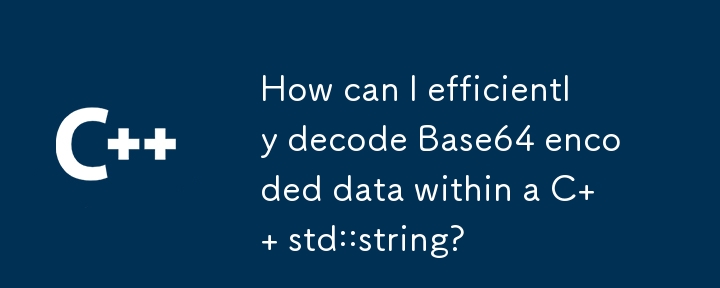如何有效解碼 C std::string 中的 Base64 編碼資料?
- DDD原創
- 2024-12-09 15:23:18874瀏覽

C 語言中的Base64 解碼片段
實作Base64 解碼
在處理std::string 物件中以二進位格式儲存的資料時,您可以遇到Base64解碼的需要。此程式碼片段提供了專門針對此類場景設計的解決方案。
以下程式碼提供了 Base64編碼和解碼功能:
base64.h:
#ifndef _BASE64_H_ #define _BASE64_H_ #include <vector> #include <string> typedef unsigned char BYTE; std::string base64_encode(BYTE const* buf, unsigned int bufLen); std::vector<BYTE> base64_decode(std::string const&); #endif
base64.cpp:
#include "base64.h"
#include <iostream>
static const std::string base64_chars =
"ABCDEFGHIJKLMNOPQRSTUVWXYZ"
"abcdefghijklmnopqrstuvwxyz"
"0123456789+/";
static inline bool is_base64(BYTE c) {
return (isalnum(c) || (c == '+') || (c == '/'));
}
std::string base64_encode(BYTE const* buf, unsigned int bufLen) {
std::string ret;
int i = 0;
int j = 0;
BYTE char_array_3[3];
BYTE char_array_4[4];
while (bufLen--) {
char_array_3[i++] = *(buf++);
if (i == 3) {
char_array_4[0] = (char_array_3[0] & 0xfc) >> 2;
char_array_4[1] = ((char_array_3[0] & 0x03) << 4) + ((char_array_3[1] & 0xf0) >> 4);
char_array_4[2] = ((char_array_3[1] & 0x0f) << 2) + ((char_array_3[2] & 0xc0) >> 6);
char_array_4[3] = char_array_3[2] & 0x3f;
for(i = 0; (i <4) ; i++)
ret += base64_chars[char_array_4[i]];
i = 0;
}
}
if (i)
{
for(j = i; j < 3; j++)
char_array_3[j] = '<pre class="brush:php;toolbar:false">std::vector<BYTE> myData;
...
std::string encodedData = base64_encode(&myData[0], myData.size());
std::vector<BYTE> decodedData = base64_decode(encodedData);';
char_array_4[0] = (char_array_3[0] & 0xfc) >> 2;
char_array_4[1] = ((char_array_3[0] & 0x03) << 4) + ((char_array_3[1] & 0xf0) >> 4);
char_array_4[2] = ((char_array_3[1] & 0x0f) << 2) + ((char_array_3[2] & 0xc0) >> 6);
char_array_4[3] = char_array_3[2] & 0x3f;
for (j = 0; (j < i + 1); j++)
ret += base64_chars[char_array_4[j]];
while((i++ < 3))
ret += '=';
}
return ret;
}
std::vector以上是如何有效解碼 C std::string 中的 Base64 編碼資料?的詳細內容。更多資訊請關注PHP中文網其他相關文章!
陳述:
本文內容由網友自願投稿,版權歸原作者所有。本站不承擔相應的法律責任。如發現涉嫌抄襲或侵權的內容,請聯絡admin@php.cn

